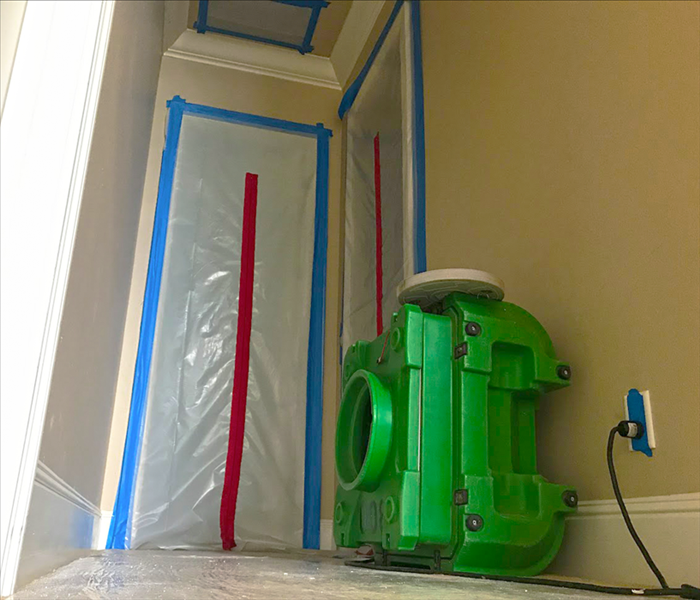Clearing the Air: Debunking Common Misconceptions About Cleaning Mold
6/23/2023 (Permalink)
 Disturbing mold can cause the mold to quickly produce a larger amount of airborne spores. Remediation experts contain the area beforehand.
Disturbing mold can cause the mold to quickly produce a larger amount of airborne spores. Remediation experts contain the area beforehand.
Mold growth is a common concern for both residential and commercial properties. It thrives in damp and humid environments, posing potential risks to structures and compromising indoor air quality. However, there are several misconceptions surrounding the cleaning and remediation of mold. In this article, we aim to debunk these myths, shed light on what indoor mold is, explore the causes of its growth, discuss common mold types, and clarify the roles of licensed mold assessors and remediation companies.
Understanding Indoor Mold:
Indoor mold refers to fungal growth that occurs within buildings, often in areas with excessive moisture and inadequate ventilation. It can manifest in various forms, including black, green, or white patches on surfaces, musty odors, and visible signs of water damage. Mold reproduces through spores, which can become airborne and spread throughout a property, potentially leading to further contamination if not addressed promptly.
Common Causes of Mold Growth:
Moisture Intrusion: Leaky roofs, plumbing issues, or poor insulation can introduce moisture into buildings, creating an ideal environment for mold growth.
Humidity: High humidity levels, especially in areas with limited airflow, contribute to moisture buildup and create a conducive atmosphere for mold to thrive.
Condensation: Improper ventilation, particularly in bathrooms, kitchens, and basements, can cause condensation on surfaces, promoting mold growth over time.
Flooding or Water Damage: Untreated water intrusion from floods, leaks, or burst pipes can create significant mold problems if not properly remediated.
Debunking Common Mold Cleaning Myths:
Myth 1: Bleach Kills Mold Completely: Contrary to popular belief, bleach is not an effective long-term solution for mold remediation. While it can help remove mold stains temporarily, it does not address the underlying issue or prevent regrowth. Professional mold remediation methods involve comprehensive removal and thorough cleaning of affected areas.
Myth 2: DIY Methods are Sufficient: While small mold problems might seem manageable, it's essential to understand that visible mold is often an indication of a more extensive issue hidden within walls, ceilings, or other concealed spaces. DIY attempts may not fully eradicate the problem, leading to recurring mold growth and potential structural damage. Professional assessment and remediation are crucial for thorough and lasting results.
Common Indoor Mold Types:
Stachybotrys Chartarum (Black Mold): This greenish-black mold is often associated with water-damaged materials and has gained notoriety with the public. Prompt remediation is essential when dealing with this type of mold.
Aspergillus: Aspergillus mold can come in various colors and is commonly found in HVAC systems, damp areas, and improperly stored food. Some species of Aspergillus can produce mycotoxins, making professional remediation necessary.
Cladosporium: Cladosporium is a widespread mold found both indoors and outdoors. It can grow on damp surfaces, such as carpets, fabrics, and wood, and is known to trigger allergies and respiratory issues in susceptible individuals.
The Role of Licensed Mold Assessors and Remediation Companies:
Licensed mold assessors conduct thorough inspections and testing to identify the presence of mold, determine the extent of contamination, and assess potential causes. They provide detailed reports and recommendations, guiding property owners in making informed decisions regarding remediation strategies.
Licensed mold remediation companies specialize in safely and effectively removing mold from affected areas. They employ industry-standard protocols, such as containment measures, air filtration, proper disposal of contaminated materials, and the use of specialized cleaning agents to ensure thorough remediation.
The State of Florida does not allow a single company to hold both an assessor's and a remediator's license. This is to help prevent foul play with the potential conflict of interest having both licenses could lead to. Be wary of companies claiming to do both sides of a mold job. A professional mold assessor will create a detailed protocol on how your specific mold situation should be remediated and a professional remediation company will request that protocol before performing any work to ensure the problem is handled correctly with the least possible chance of returning growth.
Conclusion:
Clearing up misconceptions surrounding mold cleaning is crucial for effectively addressing mold





 24/7 Emergency Service
24/7 Emergency Service